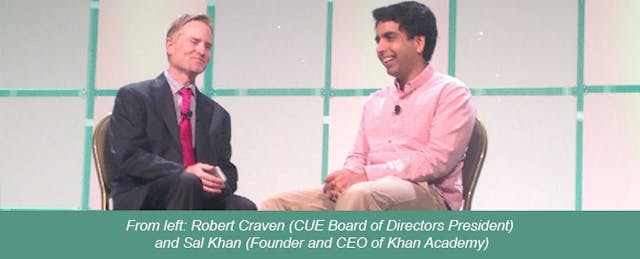Visitors to the CUE (Computer-Using Educators) conference this past weekend (March 20-22) might have experienced a strained sense of WiFi at the Palm Springs Convention Center--but there's a good reason for that. Attendance at the CUE conference was up more than 32% this year from a year ago.
Last year, attendee numbers topped out at around 4,000. By this past Saturday morning, CUE executive director Mike Lawrence reported that CUE was "pushing 5,300 attendees." And every year, the list of newbies lengthens, with over 50% of attendees coming in as first-timers.
Educational technology, for all intents and purposes, has moved into the spotlight as a focus for teachers, administrators, and entrepreneurs--something bigger education companies are very aware of, evidenced by the number of sponsored sessions.
Despite a relatively even number of sessions on theory and practicality, sessions on utility and practical tools/strategies won out in attracting the largest numbers of attendees. Below, we list some helpful tidbits that we picked up during the bevy of edtech presentations at CUE.
So you want more Chrome extensions...
First up, Chrome. "Extension" is a fancy term for a functionality that you can add to your existing Chrome browser account--and there are a heck of lot of them out there for you to choose. But educator JR Ginex-Orinion gave his version of "Chromando" training by pointing out the most useful extensions for the K-12 classroom. Among them:
- Screenleap: A little bit like Hapara, but reversed. Teachers can use this extension to send a screenshot of Chrome browser through Gmail. Great for teachers who lack the ability to display in the classroom, but are rocking 1:1 devices and student Gmail accounts.
- ChromeSpeak: This extension allows you select a text and have it read back to you--anywhere in your browser.
- SnagIt: Capture presentations or documents students are working on, annotate them with feedback, and share for review when you’re ready.
- Extensity: An extension for extensions! You can quickly turn on/turn off extensions without leaving your window--leaving you time to pick out your other favorites from JR’s extensive extensions list.
Get more information on these and other Chrome extension/application ideas on JR's webpage, or take a page out of educator.
So you're thinking about going BYOD...
Maybe you saw the final price tag that some hardware reps presented to your admins and have suddenly become passionate about going BYOD (Bring Your Own Device). Talking to Claremont technology coordinator Cheryl Fiello might sharpen your perspective on the realities of BYOD rollouts.
Fiello presented on the strengths and weakness of recent BYOD pilots in the Claremont Unified School District. Only 42% of students found smartphones to be good enough for classroom use. Teachers were even less impressed: literally 100% of teachers felt that smartphones were not good enough for the classroom 1:1 environment.
On the brighter side: 61% of students reported using iOS products outside of school, leading to Claremont’s next pilot phase: switching from BYOD program to BYOiPad.
Fiello shared her district’s Acceptable Use Policy and other usable documents in her presentation, downloadable on Dropbox.
So you're concerned about your students’ digital footprints...
The ladies at Notre Dame High School Belmont are very aware of the digital tracks they leave behind--thanks to the work of science teachers Rebecca Girard and Erin Kahn. The educators presented a student’s “digital dossier,” and provided tools that teachers can use to help students build a respectable online presence.
On the list was KQED’s “Do Now” collection, a tool for teachers concerned with students’ communication skills or responsible social media usage. Do Now’s are weekly activities for students to engage and respond to current issues using Twitter and other social media tools.
“Have students type in ‘@KQEDEdSpace + Tweet + #Topic + Class Hashtag’, and you have the perfect Do Now,” Kahn explained.
Kahn and Girard also expressed enthusiasm at having their students create blogs and websites with platforms like Weebly and Wix. “We’re preparing the students for life, past what we're doing with them,” Girard explained. “A lot of these tools--Weebly, Blogger, Tumblr, etc.--get students to think about how are they are putting themselves out there.”
Other key takeaways
A couple of key names popped up consistently throughout CUE's four-day event. Though several sponsors hosted panels and demos (we're talking giant hanging signs and pay-to-play sessions for the financially-capable), Google and Apple products took home top prize for headlining the most educator-led sessions (independent of sponsor influence). Apple products headlined 21 sessions, while Google products had 14.
Other popular session themes included augmented reality, curation (“You search and find 400 resources; places are trying to fill that void,” Lawrence said), digital assessment, and personalization. "I've seen a lot of focus on personalized learning," Lawrence observed. "I've also seen educators taking advantage of it because of the move to SmarterBalanced and digital curriculum. Digital assessments are at the tops of people's minds."
Keynote speakers at the CUE conference included Stanford doctoral candidate Dan Meyer, Khan Academy's Sal Khan, and Chief Engineer of the Starship Enterprise/Reading Rainbow host, LeVar Burton.
Special geek-out moments included the entirety of the CUE audience singing the Reading Rainbow theme song with Burton, who promoted his TV series' recent edtech release, the Reading Rainbow app. Burton reported earlier in an interview that “kids are reading about 137,000 books a week on the app.”
Closing out the event was Sal Khan, who both made an announcement about Khan Academy's new Common Core-aligned "math missions" for students, and admitted to encouraging new employees to read Orson Scott Card's "Ender's Game" as a way to envision what personalize learning could look like one day. CUE will post all keynotes on their YouTube page*, found here.
*Editor's note: A representative from CUE reported that only Dan Meyer's keynote will be posted on CUE's YouTube channel, along with clips of LeVar Burton's keynote.


